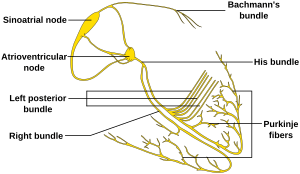Heart block facts for kids
Heart block is a type of heart disease. Your heart uses tiny electrical signals to make it beat. These signals travel along special paths in your heart. They make sure each part of your heart beats at just the right time.
When someone has heart block, there's a "block" in one of these electrical paths. This stops the electricity from moving through the heart normally. Because of this, the heart might beat more slowly than it should.
In very serious cases, the electrical paths can be so blocked that signals can't get through at all. This means the heart's electrical system can't control its beats, or it might even stop beating.
Contents
What are the Signs of Heart Block?
Many people with heart block don't feel any symptoms at all. They might not even know they have it.
Other people might notice symptoms only sometimes. Their heart might skip a beat, which can make them feel dizzy or even faint. They might also feel their heart pounding, which is called palpitations.
For the most serious cases, where the heart can't control its own beats, doctors can help. A special device called an artificial pacemaker can be put into the heart. This small device sends electrical signals to make the heart beat regularly.
What Causes Heart Block?
Sometimes, babies are born with heart block. This is known as a congenital heart block. It means they had it from birth.
More often, people get heart block later in life. Here are some common reasons:
- Other heart problems, like a heart attack.
- Certain infections, such as diphtheria.
- Some medicines, like beta-blockers. These are sometimes used to treat high blood pressure.
- Having surgery on the heart, like open-heart surgery.
Different Kinds of Heart Block
There are three main types of heart block. They range from mild to very serious.
First-Degree Heart Block
This is the least serious type of heart block. It usually doesn't cause any symptoms. People often don't even know they have it.
Second-Degree Heart Block
In this type, it takes longer and longer for the heart's electrical signals to travel from the middle of the heart to the ventricles. The ventricles are the parts of the heart that pump blood to your body. Eventually, a beat might be skipped. This can make a person feel dizzy or faint.
Third-Degree Heart Block
This is the most serious type of heart block. It's also called a complete heart block. In this condition, no electrical signals reach the heart's ventricles. This means the electrical signals cannot tell the heart to pump blood to the body.
Some people with third-degree heart block might have very few symptoms and may not need treatment. However, others can have many different symptoms. Third-degree heart block can be a medical emergency. Doctors often treat this type of heart block with a pacemaker.
How Doctors Find Heart Block
Doctors can find heart block using a test called an electrocardiogram (ECG or EKG). This test is painless. During the test, small pads are placed on a person's chest, arms, and legs. These pads record the heart's electrical activity.
A cardiologist is a doctor who specializes in the heart. They can help diagnose heart block and order other tests if needed.
Related Pages
Images for kids
 | George Robert Carruthers |
 | Patricia Bath |
 | Jan Ernst Matzeliger |
 | Alexander Miles |





